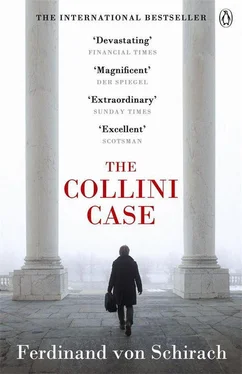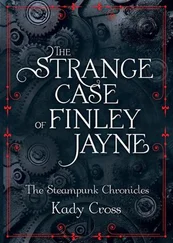‘Well, congratulations, Herr Leinen, this is going to be a great case,’ said Mattinger.
‘Anything but, I’m afraid,’ murmured Leinen.
‘Why do you say that?’
‘I’m actually trying to back out of defending the client. I stupidly put myself down on the roster of court-appointed defence counsel, but I can’t go on with the defence in this case. You’ll read about it in the file anyway, so I might as well tell you now.’ And Leinen explained what had happened. Mattinger asked if he could read his petition to withdraw from the case, and Leinen handed him a copy.
‘Yes, you put it very well,’ said Mattinger a few minutes later. ‘And what you say is perfectly understandable. I’m just not sure if it’s enough. You know that legally you can be relieved of the duty to give legal aid only if a relationship of trust between you and your client has fallen through. And Judge Köhler is a stickler for the letter of the law. I’d almost call him a technocrat.’
‘I’m going to try anyway,’ said Leinen.
‘We don’t know each other, Herr Leinen, and you won’t welcome advice from me.’
‘No, really,’ said Leinen. ‘I’d like to know what you think.’
‘I’m assuming this is your first big murder case?’
‘Yes,’ said Leinen, nodding.
‘In your place, I wouldn’t put in that petition.’
Leinen looked at him in astonishment. ‘But… I practically grew up in the Meyer family.’
Mattinger shook his head. ‘So? In the next trial, the murder may remind you of some tragic childhood experience of your own. And the case after that could keep reminding you of a girlfriend you once had who was raped. Then again, you might not like your client’s nose, or you’ll think the drugs he deals in are the worst evils to afflict mankind. You want to be a defence lawyer, Herr Leinen, so you must act like one. You’ve undertaken to defend a man. Right, maybe that was a mistake, but it was your mistake, not his. Now you’re responsible for the man, you’re all he has. You should tell him about your relationship with the victim, and then ask if he still wants you to defend him. If he does – and this is the only crucial point – you must do your best for him, make an effort, present your case to the best of your ability. This is a murder trial, not a university seminar.’
Leinen wasn’t sure whether Mattinger was right, or whether he just wanted to be facing an inexperienced adversary in the trial. The old lawyer was looking at him with a friendly expression. Maybe it was both.
‘I’ll think it over,’ said Leinen at last. ‘Many thanks anyway.’
‘I must be off too,’ said Mattinger. ‘I have to see someone in the commercial law department. But I wonder, would you like to drop in at my chambers this afternoon? Maybe it would make sense for us to discuss a few things.’
‘I’d like that.’ Leinen realized that Mattinger would want to find out how, if he stayed with his brief, he was planning to defend Collini. But he very much wanted to know the great lawyer better.
Watching an autopsy for the first time, you encounter your own death. Modern man isn’t used to the sight of dead bodies; they have disappeared entirely from the everyday world. Sometimes you see a fox lying dead at the roadside, knocked down by a car, but most of us have never set eyes on a human corpse.
When Leinen entered the Forensic Institute, Dr Reimers, the senior public prosecutor, and two police officers from the murder squad were already waiting for the head of Forensic Medicine, Professor Wagenstett. It was unusual for a defending lawyer to attend an autopsy, but Leinen wanted to know everything about the case.
The autopsy table was 2.5 metres long and 85 centimetres wide. It rested on a broad central pedestal, with two power points in the side for the electric saws and drills, a water tap that you could turn on and off with your knee, and a shower handset. The sink was set into the table. It was a modern model with a surface that could be electrically raised or lowered. ‘Almost silent,’ Wagenstett had said when the table was delivered six months earlier, happy as a boy with a new toy. Below the perforated surface – which was in three parts to allow easy cleaning – a receptacle carried blood and other residues down a slight slope to a removable filter. The fume extractor above the table looked like an outsize kitchen-cooker hood.
When Leinen saw the body he felt sick. The dead man was naked. Under the harsh white light, the hair on his chest and around his genitals looked thick, his nipples and fingernails were dark, every contrast was emphasized. Half the dead man’s face was torn away, with muscle fibre and bone exposed. The remaining eye was open, torn and milky. Like the eye of a fish, thought Leinen.
Wagenstett began the autopsy. Using his thumbs, he pressed the livor mortis marks on the torso and legs. His assistant, a sturdy female medical student with her hair pinned up, bent over the body with him.
‘The marks are dark purple,’ Wagenstett pronounced. ‘The body was not lying out of doors. That agrees with the police report.’ He turned to his assistant. ‘Look, the marks give way only slightly under strong pressure; they won’t go back to their previous state within the next few seconds. Try it for yourself.’
She tried it.
‘What do you conclude from that?’ asked Wagenstett.
‘The man has been dead more than six hours and less than thirty-six hours.’
‘Correct.’ Wagenstett straightened up. He was very much the teacher again. ‘Define those marks, will you?’
‘Livor mortis marks show when the force of gravity causes blood to settle inside the vessels.’
‘Yes, that’s right. Good.’
It went on like this for about two hours. Wagenstett dictated into a small microphone hanging above the table. Rigor mortis of the muscles had set in almost entirely. No putrefaction yet. Wagenstett picked up the report by the doctor who had attended the scene of the crime, read the data he gave on body temperature and the temperature outside the body, and nodded. Then he described the dead man: head, hair (length, height of hairline above the forehead), face, nasal structure and nostrils (‘shattered, blood and clear fluid drained away, tracks running to both ears, conspicuous on the right’), the eyes (‘left eye destroyed, not present, right eye partially present, conjunctiva pale’), the mouth cavity (‘containing reddish fluid’). Wagenstett spoke quietly and with concentration. The outward appearance of the corpse, he told his assistant, was their first contact with the dead man. One must proceed carefully, slowly and respectfully. Examine the body from top to bottom, systematically, not jumping back and forth between striking features. ‘The man is dead,’ said Wagenstett, ‘so take your time.’ He treated the body with dignity; jokes were banned at the autopsy table.
After the outer appearance of the corpse came the internal examination. Leinen had to lean against the tiled wall; his legs felt weak. Wagenstett had turned the heavy body over and was dissecting the back. With a scalpel, he cut down from the nape of the neck to the sacrum and then over both buttocks, so that his incision was Y-shaped. He separated the tissues layer by layer, removing the muscles of the back, turning the soft tissue and the left shoulder blade to one side. Leinen closed his eyes, but the smell was still there. He wanted to leave, but he was unable to move.
Between the top layers of the scalp and the bone lies a membrane suffused with blood vessels and easily removed from the pericranium. Scalping does not take much force. Wagenstett taught his students that the family of the dead have a right to a corpse looking as intact as possible. For that reason, they should make an incision at the back of the head and move the scalp towards the forehead until the skull is exposed. Then it could simply be sawn apart and the brain removed. After that you pulled the scalp down again and stitched it up so that the corpse still had a head.
Читать дальше












